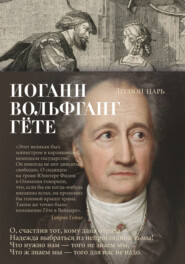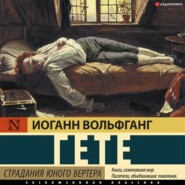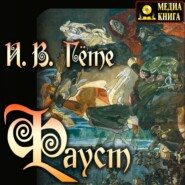По всем вопросам обращайтесь на: info@litportal.ru
(©) 2003-2024.
✖
Letters from Switzerland and Travels in Italy
Настройки чтения
Размер шрифта
Высота строк
Поля
The celebration of my birthday consisted mainly in sending me several poems in the name of my commenced but unfinished works. Among these, one was distinguished above the rest. It was called the Birds. A deputation of these happy creatures being sent to a true friend earnestly entreat him to found at once and establish the kingdom so long promised to them. Not less obvious and playful were the allusions to my other unfinished pieces, so that, all at once, they again possessed a living interest for me, and I related to my friends the designs I had formed, and the entire plans. This gave rise to the expression of wishes and urgent requests, and gave the game entirely into Herder's hands, while he attempted to induce me to take back these papers, and, above all, to bestow upon the Iphigenia the pains it well deserved. The fragment which lies before me is rather a sketch than a finished piece; it is written in poetical prose, which occasionally falls into a sort of Iambical rhythm, and even imitates other syllabic metres. This, indeed, does great injury to the effect unless it is read well, and unless, by skilful turns, this defect is carefully concealed. He pressed this matter on me very earnestly, and as I concealed from him as well as the rest the great extent of my intended tour, and as he believed I had nothing more in view than a mountain trip, and as he was always ridiculing my geographical and mineralogical studies, he insisted I should act much wiser if, instead of breaking stones, I would put my hand to this work. I could not but give way to so many and well-meant remonstrances; but, as yet, I have had no opportunity to turn my attention to these matters. I now detach Iphigenia from the bundle and take her with me as my fellow-traveller into the beautiful and warm country of the South. The days are so long, and there will be nothing to disturb reflection, while the glorious objects of the surrounding scenery by no means depress the poetic nerve; indeed, assisted by movement and the free air, they rather stimulate and call it forth more quickly and more vividly.
FROM THE BRENNER TO VERONA
Trent, morning of the 11th Sept.
After full fifty hours, passed in active and constant occupation, I reached here about 8 o'clock yesterday evening, and soon after retired to rest, so that I now find myself in condition to go on with my narrative. On the evening of the 9th, when I had closed the first portion of my diary, I thought I would try and draw the inn and post-house on the Brenner, just as it stood. My attempt was unsuccessful, for I missed the character of the place; I went home therefore in somewhat of an ill-humor. Mine host asked me if I would not depart, telling me it was moon-light and the best travelling. Although I knew perfectly well that, as he wanted his horses early in the morning to carry in the after-crop (Grummet), and wished to have them home again in time for that purpose, his advice was given with a view to his own interest, I nevertheless took it, because it accorded with my own inclination. The sun reappeared, the air was tolerable, I packed up, and started about 7 o'clock. The blue atmosphere triumphed over the clouds, and the evening was most beautiful.
Trent
The postilion fell asleep, and the horses set off at a quick trot down-hill, always taking the well-known route. When they came to a village they went somewhat slower. Then the driver would wake up, and give them a fresh stimulus, and thus we descended at a good pace with high rocks on both sides of us, or by the banks of the rapid river Etsch. The moon arose and shed her light upon the massive objects around. Some mills, which stood between primæval pine-trees, over the foaming stream, seemed really everlasting.
When, at 9 o'clock, I had reached Sterzingen, they gave me clearly to understand, that they wished me off again. Arriving in Mittelwald, exactly at 12 o'clock, I found everybody asleep except the postilion, and we were obliged to go on to Brixen, where I was again taken off in like manner, so that at the dawn of day I was in Colman. The postilions drove so fast that there was neither seeing nor hearing, and although I could not help being sorry at travelling through this noble country with such frightful rapidity; and at night, too, as though I was flying the place, I nevertheless felt an inward joy, that a favorable wind blew behind me, and seemed to hurry me towards the object of my wishes. At day-break I perceived the first vineyard. A woman with pears and peaches met me, and thus we went on to Teutschen, where I arrived at 7 o'clock, and then was again hurried on. After I had again travelled northwards for a while, I at last saw in the bright sunshine the valley where Botzen is situated. Surrounded by steep and somewhat high mountains, it is open towards the south, and sheltered towards the north by the Tyrolese range. A mild, soft air pervaded the spot. Here the Etsch again winds towards the south. The hills at the foot of the mountain are cultivated with vines. The vinestocks are trained over long but low arbourwork; the purple grapes are gracefully suspended from the top, and ripen in the warmth of the soil, which is close beneath them. In the bottom of the valley, which for the most part consists of nothing but meadows, the vine is cultivated in narrow rows of similar festoons, at a little distance from each other, while between grows the Indian corn, the stalks of which at this time are high. I have often seen it ten feet high. The fibrous' male blossom is not yet cut off, as is the case when fructification has ceased for some time.
I came to Botzen in a bright sunshine. A good assemblage of mercantile faces pleased me much. Everywhere one sees the liveliest tokens. An existence full of purpose, and highly comfortable. In the square some fruit-women were sitting with round fiat baskets, above four feet in diameter, in which peaches were arranged side by side, so as to avoid pressure. Here I thought of a verse, which I had seen written on the window of the inn at Ratisbon:
Comme les pêches et les melons
Sont pour la bouche d'un Baron,
Ainsi les verges et les bâtons
Sont pour les fous, dit Salomon.
It is obvious that this was written by a northern baron, and no less clear is it that if he were in this country, he would alter his notions.
At the Botzen fair a brisk silk-trade is carried on. Cloths are also brought here, and as much leather as can be procured from the mountain districts. Several merchants, however, came chiefly for the sake of depositing their money, taking orders, and opening new credits. I felt I could have taken great delight in examining the various products that were collected here; but the impulse, the state of disquiet, which keeps urging me from behind, would not let me rest, and I must at once hasten from the spot. For my consolation, however, the whole matter is printed in the statistical papers, and we can, if we require it, get such instructions from books. I have now to deal only with the sensible impressions, which no book or picture can give. In fact, I am again taking interest in the world, I am testing my faculty of observation, and am trying how far I can go with my science and my acquirements, how far my eye is clear and sharp, how much I can take in at a hasty glance, and whether those wrinkles, that are imprinted upon my heart, are ever again to be obliterated. Even in these few days, the circumstance that I have had to wait upon myself, and have always been obliged to keep my attention and presence of mind on the alert, has given me quite a new elasticity of intellect. I must now busy myself with the currency, must change, pay, note down, write, while I formerly did nothing but think, will, reflect, command, and dictate.
Botzen – Trent
From Botzen to Trent the stage is nine leagues and runs through a valley, which constantly increases in fertility. All that merely struggles into vegetation on the higher mountains, has here more strength and vitality; the sun shines with warmth, and there is once more belief in a Deity.
A poor woman cried out to me to take her child into my vehicle, as the hot soil was burning its feet. I did her this little service out of honour to the strong light of heaven. The child was strangely decked out, but I could get nothing from it in any way.
The Etsch flows more gently in these parts, and it makes broad deposits of gravel in many places. On the land, near the river and up the hills, the planting is so thick and close, that one fancies one thing will suffocate the other. It is a regular thicket of vineyards, maize, mulberry trees, apples, pears, quinces, and nuts. The danewort (Attig) thrives luxuriantly on the walls. Ivy with solid stems runs up the rocks, on which it spreads itself; the lizards glide through the interstices, and whatever has life or motion here, reminds one of the most charming works of art. The braided top-knots of the women, the bared breasts and light jackets of the men, the fine oxen which you see driven home from market, the laden asses, – all combine to produce one of Heinrich Roos's animated pictures. And when evening draws on, and through the calmness of the air, a few clouds rest upon the mountains, rather standing than running against the sky, and, as immediately after sunset, the chirp of the grasshoppers begins to grow loud, one feels quite at home in the world, and not a mere exile. I am as reconciled to the place as if I were born and bred in it, and had now just returned from a whaling expedition to Greenland. Even the dust, which here as in our fatherland often plays about my wheels, and which has so long remained strange to me, I welcome as an old friend. The bell-like voice of the cricket is most piercing, and far from unpleasant. A cheerful effect is produced, when playful boys whistle against a field of such singers, and you almost fancy that the sound on each side is raised by emulation. The evening here is perfectly mild no less than the day.
If any one who lived in the South, or came from the South, heard my enthusiasm about these matters, he would consider me very childish. Ah, what I express here, I long ago was conscious of, while ruffling under an unkindly sky; and now I love to experience as an exception the happiness which I hope soon to enjoy as a regular natural necessity.
Trent, the evening of the 10th Sept.
I have wandered about the city, which has an old, not to say a very primitive look, though there are new and well-built houses in some of the streets. In the church there is a picture in which the assembled council of the Jesuits is represented, listening to a sermon delivered by the general of the order. I should like to know what he is trying to palm upon them. The church of these fathers may at once be recognised from the outside by pilasters of red marble on the façade. The doors are covered by a heavy curtain, which serves to keep off the dust. I raised it, and entered a small vestibule. The church itself is parted off by an iron grating, but so that it can be entirely overlooked. All was as silent as the grave, for divine service is no longer performed here. The front door stood open, merely because all churches must be open at the time of Vespers.
Trent
While I stood considering the architecture, which was, I found, similar to other Jesuit churches, an old man stepped in, and at once took off his little black cap. His old faded black coat indicated that he was a needy priest. He knelt down before the grating, and rose again after a short prayer. When he turned round, he said to himself half-aloud: "Well, they have driven out the Jesuits, but they ought to have paid them the cost of the church. I know how many thousands were spent on the church and the seminary." As he uttered this he left the spot, and the curtain fell behind him. I, however, lifted it again, and kept myself quiet. He remained a while standing on the topmost step, and said: "The Emperor did not do it; the Pope did it." With his face turned towards the street, so that he could not observe me, he continued: "First the Spaniards, then we, then the French. The blood of Abel cries out against his brother Cain!" And thus he went down the steps and along the street, still talking to himself. I should conjecture he is one who, having been maintained by the Jesuits, has lost his wits in consequence of the tremendous fall of the order, and now comes every day to search the empty vessel for its old inhabitants, and, after a short prayer, to pronounce a curse upon their enemies.
A young man, whom I questioned about the remarkable sights in the town, showed me a house, which is called the "Devil's house," because the devil, who is generally too ready to destroy, is said to have built it in a single night, with stones rapidly brought to the spot. However, what is really remarkable about the house, the good man had not observed, namely, that it is the only house of good taste that I have yet seen in Trent, and was certainly built by some good Italian, at an earlier period. At 5 o'clock in the evening I again set off. The spectacle of yesterday evening was repeated, and at sun-set the grasshoppers again began to sing. For about a league the journey lies between walls, above which the grape-espaliers are visible. Other walls, which are not high enough, have been eked out with stones, thorns, &c., to prevent passengers from plucking off the grapes. Many owners sprinkle the foremost rows with lime, which renders the grapes uneatable, but does not hurt the wine, as the process of fermentation drives out the heterogeneous matter.
Evening of September 11.
I am now at Roveredo, where a marked distinction of language begins; hitherto, it has fluctuated between German and Italian. I have now, for the first time, had a thoroughly Italian postilion, the inn-keeper does not speak a word of German, and I must put my own linguistic powers to the test. How delighted I am that the language I have always most loved now becomes living – the language of common usage.
Torbole, 12th September (after dinner).
How much do I wish that my friends were with me for a moment to enjoy the prospect, which now lies before my eyes.
I might have been in Verona this evening but a magnificent natural phenomenon was in my vicinity – Lake Garda, a splendid spectacle, which I did not want to miss, and now I am nobly rewarded for taking this circuitous route. After 5 o'clock I started from Roveredo, up a side valley, which still pours its waters into the Etsch. After ascending this, you come to an immense rocky bar, which you must cross in descending to the lake. Here appeared the finest calcareous rocks for pictorial study. On descending you come to a little village on the northern end of the lake, with a little port, or rather landing-place, which is called Torbole. On my way upwards I was constantly accompanied by fig-trees, and, descending into the rocky atmosphere, I found the first olive-tree full of fruit. Here also, for the first time, I found as a common fruit those little white figs, which the Countess Lanthieri had promised me.
A door opens from the chamber in which I sit into the court-yard below. Before this I have placed my table, and taken a rough sketch of the prospect. The lake may be seen for its whole length, and it is only at the end, towards the left, that it vanishes from our eyes. The shore, which is inclosed on both sides by hill and mountain, shines with a countless number of little hamlets.
After midnight the wind blows from north to south, and he who wishes to go down the lake must travel at this time, for a few hours before sunset the current of air changes, and moves northward. At this time, the afternoon, it blows strongly against me, and pleasantly qualifies the burning heat of the sun. Volkmann teaches me that this lake was formerly called "Benacus," and quotes from Virgil a line in which it was mentioned:
"Fluctibus et fremiter resonans, Benace, marino."
This is the first Latin verse, the subject of which ever stood visibly before me, and now, in the present moment, when the wind is blowing stronger and stronger, and the lake casts loftier billows against the little harbour, it is just as true as it was hundreds of years ago. Much, indeed, has changed, but the wind still roars about the lake, the aspect of which gains even greater glory from a line of Virgil's.
The above was written in a latitude of 45° 50'.
I went out for a walk in the cool of the evening, and now I really find myself in a new country, surrounded by objects entirely strange. The people lead a careless, sauntering life. In the first place, the doors are without locks, but the host assured me that I might be quite at ease, even though all I had about me consisted of diamonds. In the second place, the windows are covered with oiled paper instead of glass. In the third place, an extremely necessary convenience is wanting, so that one comes pretty close to a state of nature. When I asked the waiter for a certain place, he pointed down into the court-yard: "Qui, abasso puo servirsi!" "Dove?" asked I. "Da per tutto, dove vuol," was the friendly reply. The greatest carelessness is visible everywhere, but still there is life and bustle enough. During the whole day there is a constant chattering and shrieking of the female neighbors, all have something to do at the same time. I have not yet seen an idle woman.
Lago Di Garda
The host, with Italian emphasis, assured me, that he felt great pleasure in being able to serve me with the finest trout. They are taken near Torbole, where the stream flows down from the mountains, and the fish seeks a passage upwards. The Emperor farms this fishery for 10,000 gulden. The fish, which are large, often weighing fifty pounds, and spotted over the whole body to the head, are not trout, properly so called. The flavour, which is between that of trout and salmon, is delicate and excellent.
But my real delight is in the fruit. – in the figs, and in the pears, which must, indeed, be excellent, where citrons are already growing.
Evening of September 13.
At 3 o'clock this morning I started from Torbole, with a couple of rowers. At first the wind was so favorable that we put up a sail. The morning was cloudy but tine, and perfectly calm at day-break. We passed Limona, the mountain-gardens of which, laid out terrace-fashion, and planted with citron-trees, have a neat and rich appearance. The whole garden consists of rows of square white pillars placed at some distance from each other, and rising up the mountain in steps. On these pillars strong beams are laid, that the trees planted between them may be sheltered in the winter. The view of these pleasant objects was favored by a slow passage, and we had already passed Malsesine when the wind suddenly changed, took the direction usual in the day-time, and blew towards the north. Rowing was of little use against this superior power, and, therefore, we were forced to land in the harbour of Malsesine. This is the first Venetian spot on the eastern side of the lake. When one has to do with water we cannot say, "I will be at this or that particular place to-day." I will make my stay here as useful as I can, especially by making a drawing of the castle, which lies close to the water, and is a beautiful object. As I passed along I took a sketch of it.
Sept. 11th.
The wind, which blew against me yesterday, and drove me into the harbour of Malsesine, was the cause of a perilous adventure, which I got over with good humour, and the remembrance of which I still find amusing. According to my plan, I went early in the morning into the old castle, which having neither gate nor guard, is accessible to everybody. Entering the court-yard, I seated myself opposite to the old tower, which is built on and among the rocks. Here I had selected a very convenient spot for drawing; – a carved stone seat in the wall, near a closed door, raised some three or four feet high, such as we also find in the old buildings in our own country.
An incident at Malsesine
I had not sat long before several persons entered the yard, and walked backwards and forwards, looking at me. The multitude increased, and at last so stood as completely to surround me. I remarked that my drawing had excited attention; however, I did not allow myself to be disturbed, but quietly continued my occupation. At last a man, not of the most prepossessing appearance, came up to me, and asked me what I was about. I replied that I was copying the old tower, that I might have some remembrance of Malsesine. He said that this was not allowed, and that I must leave off. As he said this in the common Venetian dialect, so that I understood him with difficulty, I answered, that I did not understand him at all. With true Italian coolness he took hold of my paper, and tore it, at the same time letting it remain on the pasteboard. Here I observed an air of dissatisfaction among the by-standers; an old woman in particular said that it was not right, but that the podestà ought to be called, who was the best judge of such matters. I stood upright on the steps, having my back against the door, and surveyed the assembly, which was continually increasing. The fixed eager glances, the good humoured expression of most of the faces, and all the other characteristics of a foreign mob, made the most amusing impression upon me. I fancied that I could see before me the chorus of birds, which, as Treufreund, I had often laughed at, in the Ettersburg theatre. This put me in excellent humour, and when the podestà came up with his actuary, I greeted him in an open manner, and when he asked me why I was drawing the fortification, modestly replied, that I did not look upon that wall as a fortification. I called the attention of him and the people to the decay of the towers and walls, and to the generally defenceless position of the place, assuring him that I thought I only saw and drew a ruin.
I was answered thus: "If it was only a ruin, what could there be remarkable about it?" As I wished to gain time and favour, I replied very circumstantially, that they must be well aware how many travellers visited Italy, for the sake of the ruins only, that Rome, the metropolis of the world, having suffered the depredations of barbarians, was now full of ruins, which had been drawn hundreds of times, and that all the works of antiquity were not in such good preservation as the amphitheatre at Verona, which I hoped soon to see.
The podestà, who stood before me, though in a less elevated position, was a tall man, not exactly thin, of about thirty years of age. The flat features of his spiritless face perfectly accorded with the slow constrained manner, in which he put his questions. Even the actuary, a sharp little fellow, seemed as if he did not know what to make of a case so new, and so unexpected. I said a great deal of the same sort; the people seemed to take my remarks good naturedly, and on turning towards some kindly female faces, I thought I could read assent and approval.
When, however, I mentioned the amphitheatre at Verona, which in this country, is called the "Arena," the actuary, who had in the meanwhile collected himself, replied, that this was all very well, because the edifice in question was a Roman building, famed throughout the world. In these towers, however, there was nothing remarkable, excepting that they marked the boundary between the Venetian domain and Austrian Empire, and therefore espionage could not be allowed. I answered by explaining at some length, that not only the Great and Roman antiquities, but also those of the Middle-Ages were worth attention. They could not be blamed, I granted, if, having been accustomed to this building from their youth upwards, they could not discern in it so many picturesque beauties as I did. Fortunately the morning sun, shed the most beautiful lustre on the tower, rocks, and walls, and I began to describe the scene with enthusiasm. My audience, however, had these much lauded objects behind them, and as they did not wish to turn altogether away from me, they all at once twisted their heads, like the birds, which we call "wry necks" (Wendehälse), that they might see with their eyes, what I had been lauding to their ears. Even the podestà turned round towards the picture I had been describing, though with more dignity than the rest. This scene appeared to me so ridiculous that my good humour increased, and I spared them nothing – least of all, the ivy, which had been suffered for ages to adorn the rocks and walls.
The actuary retorted, that this was all very good, but the Emperor Joseph was a troublesome gentleman, who certainly entertained many evil designs against Venice; and I might probably have been one of his subjects, appointed by him, to act as a spy on the borders.
"Far from belonging to the Emperor," I replied, "I can boast, as well as you, that I am a citizen of a republic, which also governs itself, but which is not, indeed, to be compared for power and greatness to the illustrious state of Venice, although in commercial activity, in wealth, and in the wisdom of its rulers, it is inferior to no state in Germany. I am a native of Frankfort-on-the-Main, a city, the name and fame of which has doubtless reached you."
An incident at Malsesine
"Of Frankfort-on-the-Main!" cried a pretty young woman, "then, Mr. Podestà, you can at once see all about the foreigner, whom I look upon as an honest man. Let Gregorio be called; he has resided there a long time, and will be the best judge of the matter."

















